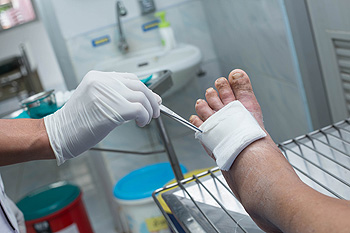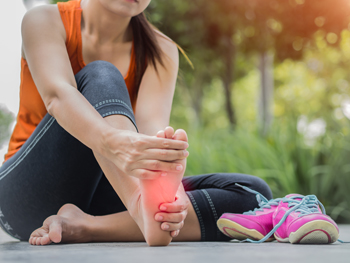NJ (908) 688-5577
NY (212) 737-2528

Diabetic foot ulcers are open wounds that develop on the feet, toes, or ankles due to reduced blood flow and nerve damage caused by diabetes. Diabetic foot ulcers are often painless, which means patients may not realize they have one until it becomes infected. Infections can spread quickly into deeper tissue, increasing the risk of bone involvement or even sepsis. Poor circulation slows the healing process, making these ulcers harder to treat. A podiatrist can help by assessing the severity of the ulcer, cleaning the wound, and applying protective dressings to reduce infection risk. In some cases, patients may need pressure-relieving footwear, a cast, or surgery to remove damaged tissue. Infected ulcers often require antibiotics, and severe infections may need hospital care. Regular foot care is important to avoid complications from diabetic foot ulcers. If you have foot ulcers as a result of diabetes, it is suggested that you are under the care of a podiatrist for ongoing treatment.
Diabetic foot care is important in preventing foot ailments such as ulcers. If you are suffering from diabetes or have any other concerns about your feet, contact Glenn Davison, DPM from Advanced Podiatry. Our doctor can provide the care you need to keep you pain-free and on your feet.
Diabetic Foot Care
Diabetes affects millions of people every year. The condition can damage blood vessels in many parts of the body, especially the feet. Because of this, taking care of your feet is essential if you have diabetes, and having a podiatrist help monitor your foot health is highly recommended.
The Importance of Caring for Your Feet
Patients with diabetes should have their doctor monitor their blood levels, as blood sugar levels play such a huge role in diabetic care. Monitoring these levels on a regular basis is highly advised.
It is always best to inform your healthcare professional of any concerns you may have regarding your feet, especially for diabetic patients. Early treatment and routine foot examinations are keys to maintaining proper health, especially because severe complications can arise if proper treatment is not applied.
If you have any questions please feel free to contact our offices located in Union, NJ and New York . We offer the newest diagnostic and treatment technologies for all your foot and ankle needs.

Outer foot pain while running can disrupt performance and indicate underlying foot issues. Several causes may contribute to this discomfort. Blisters, often caused by friction or ill-fitting shoes, can create surface pain along the foot's outer edge. Bunions, although typically near the big toe, can alter foot mechanics and lead to lateral discomfort. Flat feet may cause instability, placing strain on the outer foot, while high arches can lead to poor shock absorption and excessive pressure on that same area. Another possible cause is Morton’s neuroma, a painful condition involving nerve irritation usually felt in the forefoot but occasionally radiating outward. If you enjoy running and have developed foot pain, it is suggested that you contact a podiatrist who can provide an accurate diagnosis and treatment.
Foot Pain
Foot pain can be extremely painful and debilitating. If you have a foot pain, consult with Glenn Davison, DPM from Advanced Podiatry. Our doctor will assess your condition and provide you with quality foot and ankle treatment.
Causes
Foot pain is a very broad condition that could be caused by one or more ailments. The most common include:
Diagnosis
To figure out the cause of foot pain, podiatrists utilize several different methods. This can range from simple visual inspections and sensation tests to X-rays and MRI scans. Prior medical history, family medical history, and any recent physical traumatic events will all be taken into consideration for a proper diagnosis.
Treatment
Treatment depends upon the cause of the foot pain. Whether it is resting, staying off the foot, or having surgery; podiatrists have a number of treatment options available for foot pain.
If you have any questions, please feel free to contact our offices located in Union, NJ and New York . We offer the newest diagnostic and treatment technologies for all your foot care needs.

Ankle pain can result from various conditions, with sprains, arthritis, osteoarthritis, and tendinitis being some of the most common causes. A sprained ankle occurs when ligaments are stretched or torn, leading to pain, swelling, and bruising. Arthritis and osteoarthritis cause joint inflammation, resulting in stiffness, swelling, and chronic pain. Osteoarthritis, in particular, wears down cartilage, leading to bone-on-bone friction. Tendinitis occurs when the tendons surrounding the ankle become inflamed, causing pain, swelling, and limited range of motion. The symptoms of ankle pain can vary depending on the cause, but they generally include swelling, tenderness, difficulty moving the ankle, and, in some cases, instability. Activities like walking, running, or standing may become painful or difficult. A podiatrist can diagnose the cause of your ankle pain and recommend treatment, including targeted exercises, medication, orthotics, or, in severe cases, surgery. If you have ankle pain, it is suggested that you schedule an appointment with a podiatrist.
Ankle pain can be caused by a number of problems and may be potentially serious. If you have ankle pain, consult with Glenn Davison, DPM from Advanced Podiatry. Our doctor will assess your condition and provide you with quality foot and ankle treatment.
Ankle pain is any condition that causes pain in the ankle. Due to the fact that the ankle consists of tendons, muscles, bones, and ligaments, ankle pain can come from a number of different conditions.
Causes
The most common causes of ankle pain include:
Symptoms
Symptoms of ankle injury vary based upon the condition. Pain may include general pain and discomfort, swelling, aching, redness, bruising, burning or stabbing sensations, and/or loss of sensation.
Diagnosis
Due to the wide variety of potential causes of ankle pain, podiatrists will utilize a number of different methods to properly diagnose ankle pain. This can include asking for personal and family medical histories and of any recent injuries. Further diagnosis may include sensation tests, a physical examination, and potentially x-rays or other imaging tests.
Treatment
Just as the range of causes varies widely, so do treatments. Some more common treatments are rest, ice packs, keeping pressure off the foot, orthotics and braces, medication for inflammation and pain, and surgery.
If you have any questions, please feel free to contact our offices located in Union, NJ and New York . We offer the newest diagnostic and treatment technologies for all your foot care needs.